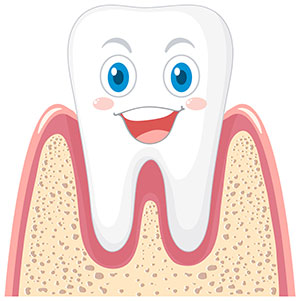A Quick Guide to Dental Care

Gum Disease
Gingivitis is the initial stage of gum disease, starting when plaque that isn't removed hardens into tartar, leading to gum irritation over time. This can result in tenderness, swelling, and potential bleeding during tooth brushing.Thankfully, gingivitis is a milder form of gum disease and is reversible. A hygienist will remove the tartar and alleviate irritation through professional cleaning.
Unchecked plaque can lead to gingivitis, which, if ignored, may progress to periodontitis, a more severe stage of gum disease. At this stage, damage can extend from the gums to the bone surrounding the tooth roots, possibly resulting in loose teeth.
Treating periodontitis typically involves comprehensive teeth cleaning under local anesthesia to thoroughly clean around the tooth roots and areas where gums have receded. This deep cleaning might span several visits. In severe cases, surgery may be required to clean the base of the teeth and reattach the gums.
Tooth Sensitivity
It is not uncommon to experience some tooth sensitivity from time to time - you may notice trigger factors with certain foods or drinks, but sometimes it could indicate another issue, such as a cracked tooth.
One challenge for dentists is that sensitivity can stem from various causes.
This makes diagnosing and treating the issue a unique process for each patient.
Sensitive teeth are a common reason people visit the dentist, mainly because many factors can contribute to this issue. When we refer to our teeth as ‘sensitive’, we typically mean experiencing sharp, brief pain triggered by certain extremes.
For some, it could be cold beverages or ice cream that spark discomfort, even a chilly day might lead to an ache. Others may find that hot drinks or soups are the culprits they need to steer clear of.
Managing sensitive teeth involves more than just avoiding triggers, identifying and treating the root cause can significantly improve your quality of life.
Booking an appointment is essential.
The dentist will want to discover which teeth are causing discomfort and the nature of the pain you’re experiencing. Is it a fleeting, sharp sensation. Does it radiate to your jaw, face, or neck. Are there specific times, like in the morning or after certain foods, when you notice it more.
Thinking about these questions beforehand can be quite helpful.
During a visit, your dentist will delve deeper than just the symptoms of sensitivity to uncover the underlying issues. Often, sensitive teeth arise from tooth enamel erosion, which exposes the dentin beneath. There are various reasons this may happen.
For instance, if you have gum disease that leads to gum recession, the roots of your teeth may become exposed. Since these roots lack enamel, they can become sensitive and painful in response to temperature changes.
It is a very common problem but important to talk to your dentist.

Scale & Polish
The significance of regular dental cleanings, like a scale and polish, cannot be overstated.No matter how diligent you are with your brushing, some plaque is bound to accumulate and will need professional care. It's important not to skip those routine appointments, otherwise, this build-up can lead to more severe dental problems, such as decay, cavities, and gum disease.
During a cleaning session, your dentist usually starts with an electric scaler, often called an ultrasonic scaler. This tool has a delicate tip that vibrates rapidly while using a stream of water to effectively eliminate calcified plaque and debris stuck between your teeth.
In addition, your dentist utilizes various hand instruments designed to reach those tricky spots. With their different shapes and sizes, these hand scalers ensure that plaque is removed even from the tightest areas.
To wrap up the treatment, your dentist will polish your teeth using a rotating brush and special toothpaste. By consistently visiting your dentist, your scale and polish sessions will be quick and comfortable, as you will effectively manage plaque with your brushing and flossing in between your appointments.
Toothache

(pardon the pun).
Whether you're dealing with a dull, relentless pain or a sharp jab when you eat or drink, these discomforts typically signals a problem with one of your teeth.
If so, it is definitely time to do a search and find a dentist in the area.
Our teeth are safeguarded by a tough outer layer known as enamel and a resilient inner structure called dentin.
However, these defenses are continuously under siege.
Plaque builds up on our teeth and, when mixed with sugary foods, produces acid. This acid works away at our enamel, leading to decay.
Decay is the primary culprit behind toothaches.
If we don’t consistently remove plaque from our teeth, the acid it emits can create cavities that only get larger over time.
Eventually, these cavities can reach the inner pulp of the tooth, leaving it exposed and vulnerable to infection.
To maintain healthy teeth, make it a priority to visit your dentist regularly and ensure your teeth are well cared for.
By following the right dental routines, you can significantly reduce the risk of decay and toothache.
Dental Phobia

The dental industry has come a long way. Today, dentists have access to a much wider array of products and treatments. The drills used are quieter and less frightening, while needles are designed to minimize discomfort.
Additionally, dentists are better trained than ever before, and many practices have transformed into warm, welcoming, and patient-friendly environments.
Read more on coping strategies...